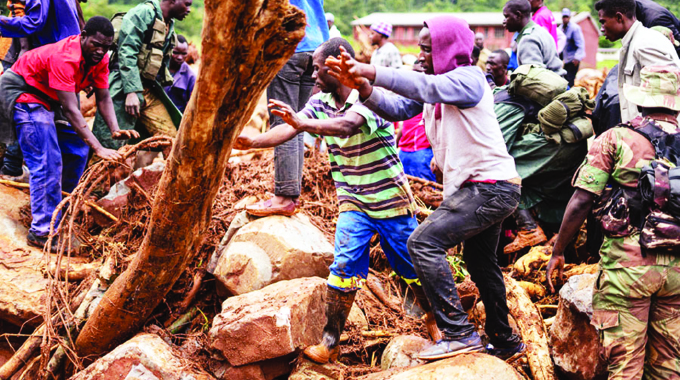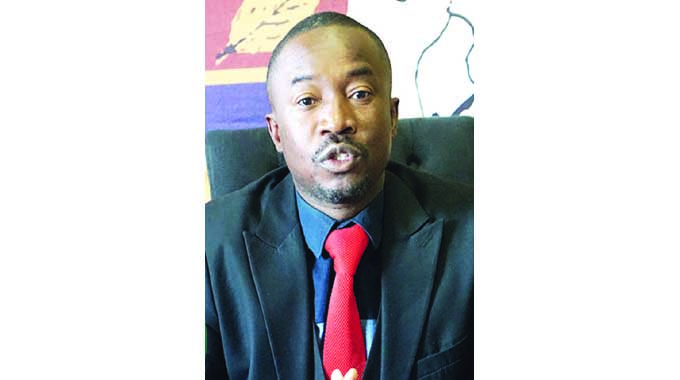Health facility treats Cyclone Idai’s wounds, soothes soul

Rumbidzai Zinyuke Senior Health Reporter
“My wounds had healed, but my soul had not. I walked around thinking that one day l would see my husband and my child. I was consumed by the pain and sunk into depression. These thoughts had an impact on my health and l became so ill. I could barely do anything.”
These words perfectly sum up the situation that many of the survivors of Cyclone Idai, which hit Manicaland province in 2019, have gone through.
Two years after the disaster, communities in the most affected districts — Chimanimani and Chipinge — have had to grapple with a lot more than getting over the loss of loved ones.
Many survivors are now struggling with conditions that developed as a result of the trauma they suffered. Many were diagnosed with asthma, high blood pressure, depression and many other conditions that are now part of their lives.
For Takemore Mufuya (38), the loss of her husband and child in the cyclone triggered high blood pressure that she had never had.
And she could not continue going back to the clinic because it was far.
For almost a year, she struggled with ill health until doctors at a mobile outreach programme diagnosed her and put her on blood pressure medication.
“At first l resisted taking BP medication because l thought I was too young for that,” she said.
“But my condition continued to deteriorate. Instead of getting better with time, I got worse. I would get these blinding headaches and feel dizzy the minute l tried to do some work.
“When the mobile clinic came again, that is when I received counselling. They told me that my BP was abnormally high and I had to take my medication or I would die and leave my two children, who survived the cyclone, motherless. I immediately came back to my senses.”
Since then, Takemore has been on medication which she has been receiving for free from the local mobile clinic.
The mobile clinic where Takemore got diagnosed and treated is part of an integrated health service provision initiative by the World Health Organisation under the Zimbabwe Idai Recovery Project (ZIRP), which is being funded by the World Bank to restore livelihoods and communities affected by Cyclone Idai.
The project, managed by UNOPS, is being implemented by several other United Nations partners, including the Food and Agriculture Organisation, UNICEF, UNFPA and World Food Programme among others.
It has helped to bring health care and other services closer to the people and thousands have benefitted from it.
According to Dr Tapiwa Nyamangodo, the clinical supervisor for the project, cases such as Takemore’s are still being detected within the cyclone affected communities.
Most people do not seek medical attention in health facilities for various reasons, but they respond very well to mobile outreach programmes.
Dr Nyamangodo has been leading a team of nurses, environmental health technicians, lab technicians, pharmacy technicians, as well as village health care workers who have been going into the communities on such programmes to offer health services.
“We are based at Mutambara Mission Hospital where we offer services, but the main part of our work is going into the communities on outreaches where we get to offer outpatient services, growth monitoring, family planning, gender based violence response and other services,” he said.
“These communities have benefited immensely from our services, especially after the disaster when roads were destroyed and transport costs became high. Even after all this time, the need for such services is still high because the people in these parts have not yet recovered.”
Dr Nyamangodo said the mobile clinics had also helped to decongest Mutambara Mission Hospital which had been registering lower numbers in the out-patients’ department.
The Covid-19 pandemic, however, posed a challenge as outreach programmes had to be remodelled.
“We had to operate from facilities, but the people had a problem with this arrangement which at times comes with user fees if it is a council clinic,” said Dr Nyamangodo.
While villagers are keen to access health care, for survivors of the cyclone, healing comes with trust that the doctor will know what to do all the time.
Said the chairman of the Cyclone Idai survivors in Kopa, Rusitu: “Our local clinics had no capacity and there was no doctor, so most people would have to travel to the mission hospitals. But the mobile clinics had the doctors and the medicines which gave people hope that they would be healed.
“This is why many people prefer them. We have the elderly who could not walk to the clinics, but are now seeking health care.”
He said survivors of such a disaster as Cyclone Idai had a lot of expectations and having access to free medical care as well as psychosocial support under one roof had been important.
ZIRP project coordinator Dr Tsitsi Siwela said the project had reached more than 45 000 beneficiaries who had accessed health services.
“This project was set up in response to the devastation caused by Cyclone Idai in March 2019,” she said. “The communities really appreciate the services because they are bringing health care services and specialist doctors closer to the communities.”
Besides the clinical services, the project has supported Government’s Covid-19 response, as well as training of health care workers on healthcare management.
“We have also supported the surveillance pillar where we have capacitated environmental health technicians response teams with knowledge and logistical support they need to respond to Covid-19,” said Dr Siwela. “We also procured motor bikes which they use to respond to Covid 19 alerts.”
Village health workers received intensive training in essential health information, basic maternal, new-born and child health services.
They have been instrumental in mobilising communities to come for services.
The GBV component of the project has been a major drawcard as women can access services as they get their baby growth monitoring and family planning services.
UNFPA has been coordinating the GBV response in partnership with Musasa Project, FACT and the Victim Friendly Unit.
UNFPA technical specialist for GBV, Ms Verena Bruno, said this had been successful through the use of the mobile one-stop centre for GBV survivors.
“Bringing the services closer to the community enhances the way they report,” she said.
“It is important to report GBV, especially sexual violence, within 72hours in order to access post rape services.
“So the impact of this programme has been great because it reduces the time of travelling from their location to the services and also saves on issues of transport which during the Covid-19 lockdown became a challenge.”
Ms Bruno said GBV services were usually available at district and provincial levels, which had made the reporting in some parts limited.
“We have seen, for instance on the national hotline numbers going up in terms of intimate partner violence and other forms of violence,” she said.
“The need for services is increasing, but services remain as fragmented as they were.
“The mobile service model is definitely one of the most effective models that we have been putting in place over the last few years and there is a need to scale up because it gets us closer to the community and enhances access to services.”
Ms Nyasha Maposa, the GBV coordinator for ZIRP, said Chimanimani had recorded a significant increase in GBV cases in the aftermath of the cyclone Idai disaster.
She said a lot was still happening in the communities that needed to be addressed.
“There are still men who blame their wives for things that happened during Cyclone Idai,” said Ms Maphosa.
“One case we have is of a couple that had trouble conceiving and when they finally had their child, that baby was swept away by the cyclone.
“The father blames the wife that she didn’t try hard enough to save that child. We have so many cases like these of women going through emotional suffering. They come for counselling. Unfortunately, these people are still grieving and we have not been able to convince some of the men to come for couple counselling. Men bottle up their feelings.”
Ms Maphosa said during the 16 days of activism against GBV which began on Thursday last week, there was need for intensified awareness campaigns to try and reach out to the men who still use culture to abuse women.
“We still need to tell them that it’s ok to talk to someone,” she said. “We have people suffering from BP and these are sometimes caused by the pressures they are going through at home.
“We are trying to ensure that during these 16 days of activism against GBV we also keep talking to women about speaking out and reaching out for help.”
World Bank country manager for Zimbabwe Ms Marjorie Mpundu commended the implementation of the programme which she said had been instrumental in bringing health services closer to the people.
“One of the things we tried to do was help communities restore health services that were available originally before the cyclone,” she said.
“We have done the rehabilitation of basic health service structures like the clinics and l am happy that this programme has integrated the health, the Covid response, but more importantly the GBV aspects.
“This is a good way of offering one stop health and social support to the community and seeing them respond to the calamity that they faced.”
Ms Mpundu said the bank was now supporting the delivery of Covid-19 vaccines which were also being administered as part of the services offered.
The project will sadly come to an end next month, but there is hope among the implementers and the beneficiaries that more funding will be availed to ensure these services continue.
The need is definitely still there.









Comments